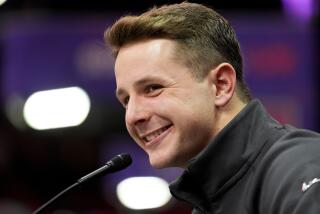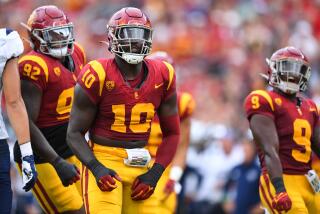Eli’s Not Coming : Former BYU Lineman Herring Has the Ability to Play in NFL, but It’s Never on Sunday for This Mormon
- Share via
PROVO, Utah — Eli Herring has the size. He stands 6 feet 8 and weighs 330 pounds.
Eli Herring has the talent. As an offensive tackle for Brigham Young, Herring had the agility to attract interest from nearly all 30 NFL teams.
Eli Herring has the opportunity. The Oakland Raiders selected him in the sixth round of this year’s draft.
Eli Herring still has the desire. The chance to continue his love affair with football and provide financial security for his family elicits powerful feelings within him.
But Eli Herring has no intention of playing in the NFL. He sent word to the Raiders and every other club that expressed interest in him that he had decided to pass up a pro football career and become a math teacher.
Why?
Because Eli Herring is a devout Mormon who won’t play on Sunday.
Period. End of subject.
“If they ever change to Saturdays, I’d be very interested,” he said.
The Raiders, while respecting Herring’s beliefs, have tried to get him to join them. Team executive Bruce Allen flew to Utah and talked to Herring about the kinds of contracts second-round draft choices got this year. The Raiders would have paid Herring $500,000 a year for as many as three years. His salary as a teacher will be about $22,000 a year.
Raider linebacker coach Fred Whittingham, himself a Mormon and a former player and coach at BYU, invited Herring and his wife, Jennifer, to the house to discuss the situation.
Herring has listened politely. He has talked extensively with family, friends and football people. But he hasn’t budged.
“Sunday is a day to go to church, instead of a working day.” he said. “It’s a day to spend with the family. It’s a day to remember the Lord. It’s a day to get away from worldly things and refocus. That’s what’s important to me.
“I think people need role models. Playing in the NFL is a good way to be a role model. But more important is the strict observance of the Sabbath. This was a big opportunity for me to provide security for my family, but it was not big enough for me to do something I felt was wrong in terms of the Lord.”
This is not a decision that Herring made easily.
Near the end of his senior year with the Cougars, Herring agonized. Day and night, playing or practicing, eating or working out, he thought about his future.
Those around him were not of one mind. Even his parents were divided on the issue. Herring’s mother, Lynn, staunchly believes that the Bible very clearly prohibits playing on Sunday. His father, David, while just as devoted to his faith, saw the other side of the situation.
Having raised seven kids, David Herring, supervisor of heating and air conditioning at BYU, knows what a salary of perhaps a million dollars could mean to someone starting out with a family of his own. Eli and Jennifer have an 18-month old daughter, Hannah.
The leaders of his church told Eli they would support him regardless of his decision. Jennifer said the same thing.
Herring didn’t decide until after last season, and he found his answer where he has always found answers--in the Bible.
“I studied the Scriptures and what they taught,” Herring said. “I thought of the things God has given me in my life and I decided that the most important thing in my life was to keep the Sabbath holy.
“When I reached a decision, I didn’t make it public at first. I was afraid people would think I was a real idiot, that I didn’t have a brain in my head. But people have been very nice.”
Still, not everyone agrees with him.
“My coach [BYU offensive line coach Roger French] thinks I’m crazy not to play,” Herring said, breaking into a grin.
“I do think he’s crazy,” French said. “He had a chance to make some money for his family, maybe get a signing bonus. That would give him a slight edge, get him a nest egg for his family to get started off on the right foot. When he gets out in the cruel world, he might find things didn’t go exactly as he’d hoped. He might have to struggle some in poverty. He’ll still be happy, but it would have been nice to have a few dollars.”
French said Herring’s decision didn’t change French’s relationship with his player.
“It didn’t affect his attitude,” French said. “He’s always been a hard worker and he still was. But it had never even crossed my mind that he wouldn’t be going to the pros. I thought he was directing himself toward a pro career. When he said he wasn’t, I thought, ‘Well, we’ll try to make him the best football player we can at BYU.’ ”
And whether he wanted it or not, Herring was a highly attractive pro prospect.
“He had ability,” French said. “He could run, he was quick on his feet, he had agility, he was a good pass protector and he was such a big fellow that it was hard for people to get around him. [Scouts] saw all that talent in such a robust body.”
Herring, ranked among the top five draft-eligible offensive linemen by pro scouts, asked BYU’s sports information director, Ralph Zobell, to advise NFL clubs not to waste a draft pick.
That didn’t deter the Raiders. They’d heard that before, though for different reasons.
“Bo [Jackson] said he wouldn’t play,” Raider owner Al Davis said. “So did Rocket [Ismail].”
Jackson, who originally declared that he would devote himself solely to baseball after being drafted by the Tampa Bay Buccaneers, wound up playing for the Raiders after they had taken a chance and drafted him. Ismail signed with the Canadian Football League but eventually joined the Raiders.
After Herring became a Raider draftee, he sat down and talked with Whittingham.
“Eli,” the Raider assistant said, “what about Steve Young? What about Todd Christensen? They and other Mormons have played.”
Replied Herring, “That’s fine for them. It’s not fine for me.”
“I came away with great respect for him,” Whittingham said. “If he feels it’s not right to play, that’s between Eli and the Lord. If that’s his decision, we’ll support him. . . . But the door is always open in case, maybe, he changes his mind.”
Don’t bet on it, David Herring said.
“You can pretty well go to the bank with the fact that Eli won’t play,” he said.
Herring’s father is happy with the decision his son has made, especially after being made aware of the risk of injury in a pro career, but David Herring admits that the money was a temptation.
“That was something you think about,” he said. “How could it not be? How would you not think about a million dollars? It’s tough. Sons help their folks out, so that was something to consider.
“But a million dollars doesn’t buy you good health. I’m not crazy about the thought of watching my son be in pain for the rest of his life.
“Eli loves to teach, and a good teacher can be worth his weight in gold.”
Herring still would like to be on the field.
“It was very satisfying playing good football,” he said. “I miss that.”
But he has satisfied some of those longings by helping out as an assistant coach at Springville High near Provo, his old high school. And, indeed, Herring might pursue a college coaching job sometime in the future.
But for now, he and family live in a small apartment on the BYU campus. He was driving a 1982 Nissan with 199,000 miles on it but recently bought a newer car, a 1983 Buick.
His life for the next few years might be a financial struggle.
“He has a huge amount of integrity,” Whittingham said. “People like him can be very happy without money. He’s interested in taking care of his family and doing for others. He’s got his priorities straight and money is not a priority. He doesn’t believe you are going to buy your way into the kingdom of heaven.”
More to Read
Go beyond the scoreboard
Get the latest on L.A.'s teams in the daily Sports Report newsletter.
You may occasionally receive promotional content from the Los Angeles Times.










